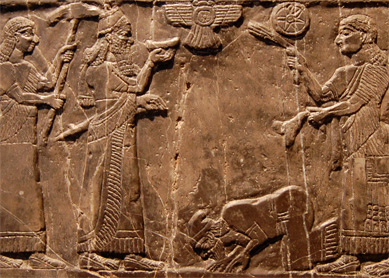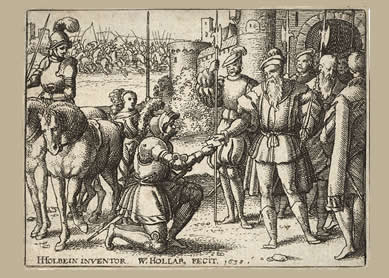The kings of Israel and Judah were believed to serve as Yhwh’s agents to rule the nation. They were expected to observe his covenant and laws, to defend the nation and engage in offensive war when deemed necessary, and to rule the people with justice (mishpat) and righteousness (tsedaqah). Although they were granted wide powers to carry out these tasks, the ancients believed that the kings would suffer divine punishment if they violated the covenant and laws. Yhwh’s prophets would generally announce such judgment against wayward kings when the court officials and priests failed to act.
Biblical authors claim that the kings of Israel and Judah were divinely chosen and that they were expected to abide by the covenant (see, for example, Deut 17:14-17, 1Sam 8-12, 1Kgs 2:3-4). Ps 2 calls the Davidic king a “son” of Yhwh. In a similar way, powerful kings in ancient treaties called their lesser allies “sons.” Thus, Israelites saw their king as a lesser agent of their god, ruling on his behalf (see Hag 2:20-23). Since Yhwh was in charge, he was responsible for protecting the king of Israel from threats by enemies (2Sam 7, Ps 2) and for punishing him and even removing him if he did not fulfill divine expectations (1Sam 13-14, 2Sam 7, 1Kgs 11:29-39). Ps 72 calls upon G-d to grant the king divine justice and righteousness so that he might rule the people properly, and Isa 32:1-2 calls upon the king to rule in righteousness so that his officers will govern with justice (see Isa 9:5-9, Isa 11:1-9).
Israel was not always happy with the idea of kingship. Samuel’s speech to Israel in 1Sam 8:10-18 indicates that the king has the right to take men for military service; women for domestic service; and land and a tenth part of the harvest, flocks, and herds for the support of the monarchy, and to require state service by both the people and their animals. Friction over these rights of the king, especially the right to forced labor, may even have led to the dissolution of the united monarchy (1Kgs 12:1-19).
Biblical law codes provide some instruction about kingship. The people had to respect the office of the monarch: Exod 22:27 forbids the people from cursing G-d or the prince (nasi, a term sometimes used for the monarch). But more important, the book of Deuteronomy provides many rules to limit the king’s power (Deut 17:14-20): the king must be from the people of Israel and chosen by their deity; he must not multiply horses for himself or send the people back to Egypt to acquire them; he must not multiply wives for himself; and he must not acquire excessive silver and gold for himself. The king is to study the Torah daily under the supervision of the levitical priests so that he might observe Yhwh’s commandments properly and understand his proper role as king. 2Kgs 22 portrays King Josiah’s officers reading a newly discovered Torah scroll to him, and he subsequently declares a program of religious reform and national restoration in Judah and Israel (2Kgs 23:1-31).
According to the Torah, kings were not in charge of the judicial system. Deut 16:18-17:20 calls for an independent judiciary of officers and priests in which the high priest serves as the chief justice. Consequently, the kings of Israel are subject to Yhwh’s law via an earthly court. And when these courts failed, the prophets stepped in. When David commits adultery with Bathsheba and engineers the murder of her husband, the prophet Nathan condemns him, although Yhwh forgives David when he repents (2Sam 12). When Ahab condemns Naboth to death on false charges of sedition against the monarchy in order to seize his property in Jezreel, Elijah condemns both Ahab and his dynasty, although when Ahab repents, Elijah grants him the mercy to die so that he does not see the downfall of his family (1Kgs 21).





